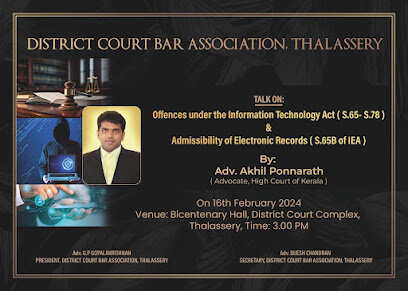Best Bail Bond Service Lawyers in Kannur
Share your needs with us, get contacted by law firms.
Free. Takes 2 min.
List of the best lawyers in Kannur, India
About Bail Bond Service Law in Kannur, India
Bail bond service is a crucial aspect of the criminal justice system in Kannur, as it enables individuals accused of an offence to secure temporary release from custody while awaiting trial. In India, including Kannur, the provisions governing bail and bonds fall under the Criminal Procedure Code, 1973 (CrPC). Bail is typically granted on furnishing a bond, often with or without sureties, assuring that the accused will appear before the court as required. Bail bond agents or sureties may assist in this process. The primary purpose of bail is to ensure the accused’s appearance in court, without unnecessary detention before conviction.
Why You May Need a Lawyer
Seeking legal advice in bail bond matters is essential because bail law involves various complexities and legal interpretations. Common situations where people require a lawyer’s help include:
- If you or a loved one has been arrested and need to apply for bail
- When bail is opposed or rejected by the police or Magistrate
- If you are unsure about the conditions imposed by the court for granting bail
- To draft and present a strong bail application
- For assistance with producing sureties or understanding the bond requirements
- When there are allegations of breach of bail conditions
- If you are seeking anticipatory bail (bail before arrest) or regular bail
- To appeal against a denial of bail
A lawyer can guide you through the procedures, prepare documentation, and advocate on your behalf to increase the likelihood of bail being granted quickly.
Local Laws Overview
In Kannur, the regulations governing bail and bail bonds are mainly derived from national legislation but are enforced with reference to local courts and police practices. The essential points include:
- Bailable vs. Non-Bailable Offences: The CrPC divides offences into bailable and non-bailable. For bailable offences, bail is a right; for non-bailable, it is at the discretion of the court.
- Bail Bond Requirements: The accused may be asked to provide a personal bond, sometimes supported by sureties-people who guarantee the accused’s appearance in court.
- Sureties: Sureties should generally be local, and must not have criminal backgrounds. The court decides the amount and procedure for verification.
- Anticipatory Bail: Can be granted ahead of arrest if the person apprehends arrest on accusation of a non-bailable offence.
- Role of Police: Police may grant bail in bailable offences but not in non-bailable ones.
- Jurisdiction: Applications are made before the Judicial Magistrate Courts or Sessions Court in Kannur, depending on the severity of the offence.
Frequently Asked Questions
What is a bail bond?
A bail bond is a legal document or assurance given to a court to secure the release of an accused person, with the promise that they will appear before the court as required.
Who can apply for bail in Kannur?
Generally, any person detained or arrested in connection with a criminal offence has the right to apply for bail through the courts in Kannur.
What is the difference between bailable and non-bailable offences?
In bailable offences, bail is granted as a matter of right, typically by the police; for non-bailable offences, bail is at the discretion of the court, considering case facts and severity.
How long does it take to get bail in Kannur?
The time can vary greatly. For bailable offences, it may be granted within hours by the police. For non-bailable offences, it depends on how quickly a petition is filed and heard in court, often taking a few days.
Are there conditions attached to bail bonds?
Yes, the court may impose conditions such as regular court appearances, not tampering with evidence, or not leaving Kannur district without permission.
What happens if bail conditions are violated?
If the accused violates bail conditions, the bail can be cancelled, leading to re-arrest. The surety may also face legal consequences.
Can bail be denied?
Yes, in serious offences or where the court feels the accused is likely to abscond, repeat the crime, or influence witnesses, bail can be denied.
Who can act as a surety for a bail bond?
Any responsible local person with a verifiable address and no criminal background can act as a surety, subject to court approval.
What documents are required for a bail bond?
Typical documents include proof of identity and residence of the surety, bail application, charge sheet, and any other documents required by the court.
Can bail orders be challenged?
Yes, both the accused and the prosecution can challenge bail orders in higher courts if they are not satisfied with the lower court’s decision.
Additional Resources
If you need further help in bail bond matters in Kannur, consider these resources:
- Kannur District Court: For bail applications and legal proceedings.
- Kerala State Legal Services Authority (KELSA): Provides legal aid and guidance, especially for those unable to afford a private lawyer.
- Local Bar Associations: For assistance in finding credible bail bond lawyers and advocates in Kannur.
- Kannur Police Stations: For police bail in bailable offences and initial inquiries.
- District Legal Aid Clinics: Free legal counsel for eligible individuals.
Next Steps
If you or someone you know needs legal assistance with bail bond services in Kannur:
- Contact a qualified criminal lawyer or legal aid service as soon as possible.
- Gather necessary documents such as arrest details, FIR copy, and identity/address proof.
- Consult with your lawyer about the specific facts of your case and your eligibility for bail.
- File the appropriate bail application with the help of your lawyer in the correct court.
- Attend all court hearings and follow the legal advice provided to you.
Matters of bail and bail bond law can have significant consequences. Getting prompt and reliable legal help is the best way to ensure your rights are protected and the process is followed correctly.
Lawzana helps you find the best lawyers and law firms in Kannur through a curated and pre-screened list of qualified legal professionals. Our platform offers rankings and detailed profiles of attorneys and law firms, allowing you to compare based on practice areas, including Bail Bond Service, experience, and client feedback.
Each profile includes a description of the firm's areas of practice, client reviews, team members and partners, year of establishment, spoken languages, office locations, contact information, social media presence, and any published articles or resources. Most firms on our platform speak English and are experienced in both local and international legal matters.
Get a quote from top-rated law firms in Kannur, India — quickly, securely, and without unnecessary hassle.
Disclaimer:
The information provided on this page is for general informational purposes only and does not constitute legal advice. While we strive to ensure the accuracy and relevance of the content, legal information may change over time, and interpretations of the law can vary. You should always consult with a qualified legal professional for advice specific to your situation.
We disclaim all liability for actions taken or not taken based on the content of this page. If you believe any information is incorrect or outdated, please contact us, and we will review and update it where appropriate.












